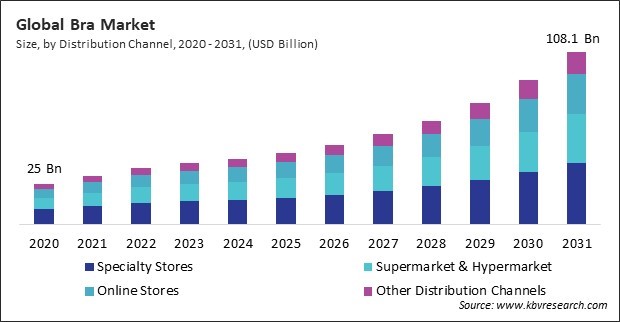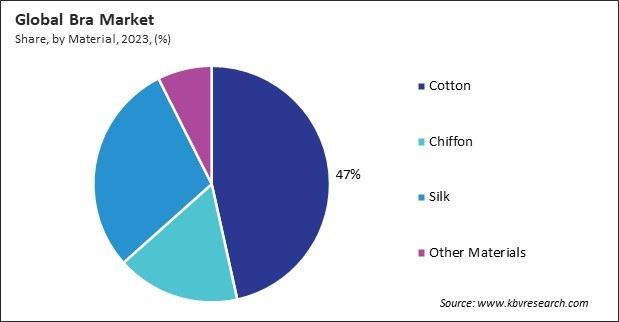“Global Bra Market to reach a market value of 108.1 Billion by 2031 growing at a CAGR of 14.9%”
The Global Bra Market size is expected to reach $108.1 billion by 2031, rising at a market growth of 14.9% CAGR during the forecast period. In the year 2023, the market attained a volume of 2,003.27 million units, experiencing a growth of 13.5% (2020-2023).
The activewear and athleisure trends in the U.S. and Canada have propelled the popularity of sports bras, contributing to overall market growth in the region. The established retail and e-commerce infrastructure of North America has a significant impact on the demand for bras, providing consumers with convenient access to a diverse selection of brands and varieties. Therefore, the North America segment acquired 27% revenue share in the market in 2023. In terms of volume, by the year 2031, 665.91 million units of bra are expected to be utilized by this region. The growing emphasis on body positivity and inclusive sizing has encouraged brands to expand their offerings, appealing to a broader audience across different body types and preferences. Additionally,

There is a rising demand for ergonomic support, with bras now tailored to accommodate diverse body shapes and needs. This includes options for fuller busts requiring additional support and bras for petite frames, which may need lighter padding or more delicate designs. These bras are ergonomically designed to provide comfort, promote appropriate posture, and alleviate strain on the back and shoulders. Hence, such factors are propelling the growth of the market. Additionally, beyond physical support, specialized fits that consider different breast shapes and needs are becoming an industry standard, as scientific research reveals that breast shape and tissue density can vary widely among women, impacting the effectiveness and comfort of different bra styles. Recognizing this, many brands now offer customized fittings and bras specifically designed for varied breast shapes, such as fuller, shallower, or asymmetrical profiles. By catering to these anatomical differences, companies enhance comfort and promote long-term breast health. Thus, this health-conscious approach has expanded the bra market.
However, the prevalence of low-cost options has also led to high price sensitivity among consumers, which restricts brands from investing in innovation. Developing unique materials or advanced support technologies requires significant investment, but many companies are reluctant to pursue these innovations when there’s a risk consumers may not pay extra for them. As a result, the market is at risk of stagnation, with brands opting for more conventional designs to minimize risk rather than pushing for distinctive, innovative products. This has a limiting effect on brand differentiation and may reduce the overall growth potential in the industry. Thus, this price sensitivity can deter premium and innovative brands from sustaining long-term growth, obstructing the expansion of the market.
Based on material, the market is classified into cotton, chiffon, silk, and others. The silk segment procured 17% revenue share in the market in 2023. In terms of volume, 1,491.32 million units of silk bra are expected to be utilized by the year 2031. Silk bras attract consumers looking for elegance, softness, and a gentle feel against the skin, making them popular for special occasions or as luxury items. Silk’s natural sheen and lightweight properties offer a unique sensory experience, appealing to customers willing to invest in high-quality materials. As a result, the silk segment maintains a strong presence, driven by demand from consumers who prioritize sophistication and indulgence in their intimate wear.

On the basis of distribution channel, the market is divided into specialty stores, supermarkets & hypermarkets, online stores, and others. The supermarkets & hypermarkets segment recorded 28% revenue share in the market in 2023. In terms of volume, 1,401.26 million units of bra are expected to be sold through supermarkets and hypermarkets by the year 2031. The supermarkets and hypermarkets segment has grown by offering convenience and accessibility, allowing consumers to purchase bras while shopping for other essentials. These outlets appeal to time-conscious customers who value efficiency, as they combine the availability of intimate apparel with a broader range of daily necessities under one roof.
By product, the market is segmented into t-shirt bra, sports bra, multi-way bra, adhesive bra, and others. The t-shirt bra segment witnessed 34% revenue share in the market in 2023. In terms of volume, 1,350.78 million units of t-shirt bra would be utilized by the year 2031. T-shirt bras are known for their seamless design, which creates a smooth appearance under clothing, making them ideal for casual and professional wear. These bras prioritize comfort and invisibility under fitted garments, qualities that resonate with consumers seeking a versatile, go-to option. Their practicality and adaptability to various outfits and body types make t-shirt bras a staple.
Free Valuable Insights: Global Bra Market size to reach USD 108.1 Billion by 2031
Region-wise, the market is analyzed across North America, Europe, Asia Pacific, and LAMEA. The Asia Pacific segment procured 43% revenue share in the market in 2023. In terms of volume, by the year 2031, 3,582.85 million units of bra are expected to be utilized by this region. A combination of rising disposable incomes, rapid urbanization, and an expanding middle-class population fuels the regional market's growth. As more consumers in countries like China, India, and Japan gain purchasing power, there is increased demand for quality lingerie, including bras that offer comfort, style, and functionality. Local and international brands are responding by expanding their regional presence and catering to diverse preferences.
| Report Attribute | Details |
|---|---|
| Market size value in 2023 | USD 38.4 Billion |
| Market size forecast in 2031 | USD 108.1 Billion |
| Base Year | 2023 |
| Historical Period | 2020 to 2022 |
| Forecast Period | 2024 to 2031 |
| Revenue Growth Rate | CAGR of 14.9% from 2024 to 2031 |
| Quantitative Data | Volume in Million Units, Revenue in USD Billion, and CAGR from 2020 to 2031 |
| Number of Pages | 334 |
| Tables | 770 |
| Report coverage | Market Trends, Revenue Estimation and Forecast, Segmentation Analysis, Regional and Country Breakdown, Competitive Landscape, Porter’s 5 Forces Analysis, Company Profiling, Companies Strategic Developments, SWOT Analysis, Winning Imperatives |
| Segments covered | Product, Material, Distribution Channel, Region |
| Country scope |
|
| Companies Included | Victoria’s Secret & Co., Agent Provocateur (Fourmarketing Limited), MAS Holdings Limited, Ann Summers Ltd. (Gold Group International Ltd.), Bluebella Ltd., Felina GmbH (Lauma Lingerie.), Hanky Panky Ltd., La Perla Fashion Holding N.V., PVH Corp., Stella McCartney Limited |
By Material (Volume, Million Units, USD Billion, 2020-2031)
By Distribution Channel (Volume, Million Units, USD Billion, 2020-2031)
By Product (Volume, Million Units, USD Billion, 2020-2031)
By Geography (Volume, Million Units, USD Billion, 2020-2031)
The Market size is projected to reach USD 108.1 billion by 2031.
Increased Demand for Comfort and Functionality are driving the Market in coming years, however, Environmental and Ethical Concerns restraints the growth of the Market.
Victoria’s Secret & Co., Agent Provocateur (Fourmarketing Limited), MAS Holdings Limited, Ann Summers Ltd. (Gold Group International Ltd.), Bluebella Ltd., Felina GmbH (Lauma Lingerie.), Hanky Panky Ltd., La Perla Fashion Holding N.V., PVH Corp., Stella McCartney Limited
.In the year 2023, the market attained a volume of 2,003.27 million units, experiencing a growth of 13.5% (2020-2023).
The Specialty Stores segment is leading the Market by Distribution Channel in 2023; thereby, achieving a market value of $38.7 billion by 2031.
The Asia Pacific region dominated the Market by Region in 2023; thereby, achieving a market value of $48.2 billion by 2031.
Our team of dedicated experts can provide you with attractive expansion opportunities for your business.

 Drivers
Drivers
 Restraints
Restraints
 Opportunities
Opportunities
 Challenges
Challenges
